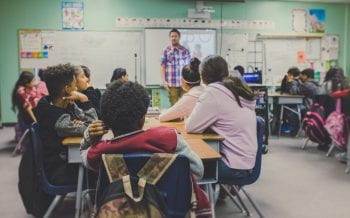As schools around the country have ramped up security efforts in response to recent school shootings, a new study from the Brown School at Washington University in St. Louis suggests that increased surveillance is having a detrimental impact on academic performance.
Tag: education
40% of student borrowers lack a four-year degree (Links to an external site)
“Take my word for it”: Group Texts and Testimonials Enhance State and Federal Student Aid Applications

Abstract As the cost of college continues to rise, it has become increasingly important for students to apply for financial aid. However, many students are unaware of the benefits of the Free Application for Federal Student Aid (FAFSA). We launched a field experiment with a non-profit organization to explore how both informational- and testimonial-type text […]
Using Counterfactual Modeling and Machine Learning Generated Propensity Scores to Examine Black Social Control and Mathematics

Abstract The Race, Gender, and Social Control in STEM (RGSC-STEM) Lab has established important and long overdue connections between state violence, schooling, and racial inequities in mathematics. RGSC-STEM work has been guided by the question of whether our national priority to fill the STEM pipeline in schools requires them to first drain the school to […]
Experimental Evidence on Consumption, Saving, and Family Formation Responses to Student Debt Forgiveness (Links to an external site)

The Earned Income Tax Credit (EITC) provides substantial financial support to low-income Universal basic income has gained renewed interest among policymakers and researchers in the U.S. While research indicates that unconditional cash transfers produce diverse benefits for households, public support lags in part due to the predicted unemployment and frivolous As policy-makers grapple with whether […]
W.T. Grant Foundation awards $512k to study impact of Choice Neighborhood Initiative
Press release: June 8, 2022 Jason Jabbari, research assistant professor with the Social Policy Institute at Washington University in St. Louis, received a $512k grant from The William T. Grant Foundation to understand if and how the Choice Neighborhood Initiative (CNI) reduces racial inequalities in academic outcomes for children and youth. Alongside Jabbari, co-principal investigators […]
Disrupted and Disconnected: Child Activities, Social Skills, and Race/Ethnicity During the Pandemic

Abstract Early in the COVID-19 pandemic, parents reported that their children spent the majority of their time at home, which can dramatically change their activities and negatively impact their social skills. However, research has yet to uncover the relationships between changes in activities during the pandemic and children’s social skills, nor the degree to which […]
Apprenticeships increase employment, earnings, and optimism in the technology sector (Links to an external site)

Given the novel and rapidly changing nature of the labor market, learning new skills quickly will become an increasingly important aspect of workforce development and social mobility. The Social Policy Institute investigates LaunchCode, a St. Louis boot camp with an apprenticeship model, as a viable option to increase wealth-building opportunities and upskill a more diverse labor […]
Increased School Breakfast Participation from Policy and Program Innovation: The Community Eligibility Provision and Breakfast after the Bell

Abstract School meals provide significant access to food and nutrition for children and adolescents, particularly through universal free meal mechanisms. Alongside added nutritional meal requirements under the Healthy, Hunger-Free Kids Act (2010), schools can utilize meal program and policy mechanisms such as the Community Eligibility Provision (CEP) and Breakfast after the Bell (BATB) to increase […]
Black college grads sought college degrees as tickets to success. Now they’re buried in debt (Links to an external site)
The St. Louis Public Radio interviewed Jason Jabbari, researcher at SPI, about the harmful effects of student debt, especially on those who did not complete their degree.
‘High-Surveillance’ Schools Lead to More Suspensions, Lower Achievement (Links to an external site)
New research from Jason Jabbari, SPI data analyst, finds schools that tighten security and surveillance in response to shootings or other acts of violence may worsen long-term academic progress, particularly for Black students.
Cameras Are Being Used To Punish Students, Not Stop School Shooters (Links to an external site)
Forbes recently described a study by Jason Jabbari, SPI researcher, and Odis Johnson, SPI faculty affiliate. The study found increase security meant to protect students has led to high suspensions schools with decrease math achievement and college admission.
Women can’t be stopped: Applying resiliency of pandemic struggles to acquire new, high-quality job opportunities
International Women’s Day marks one year since the COVID-19 crisis began. Over the past year, the pandemic drastically cut women from the workforce in the United States and beyond. However, despite all of this, there is a chance for a new opportunity. Women around the world have an opportunity now to apply their resiliency to acquire new skills and re-enter the workforce in industries where they have been historically under-represented.
CityStudioSTL Faculty Course Grants (Links to an external site)
The Collateral Damage of In-School Suspensions: A Counterfactual Analysis of High-Suspension Schools, Math Achievement and College Attendance
Even the least severe forms of exclusionary discipline are associated with detrimental effects for students that attend schools that overuse them. With a nationally representative longitudinal study of high school students, we utilize propensity score weighting to limit selection bias associated with schools that issue high numbers of in-school suspensions. Accounting for school social order […]
Disparate Impacts: Balancing the Need for Safe Schools With Racial Equity in Discipline
Policy responses to gun violence within K-12 school systems have not stopped the increasing frequency of their occurrence, but have instead increased racial and ethnic disparities in multiple forms of discipline. The crisis prevention policies that follow school shootings tend to exacerbate racial and ethnic discipline disparities (a) within schools as practitioners enact policies with […]